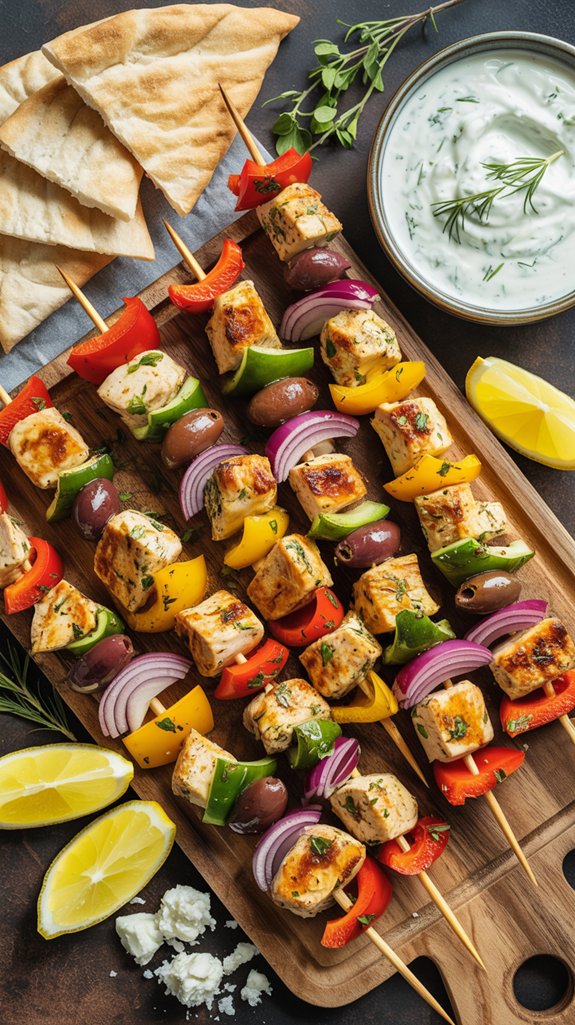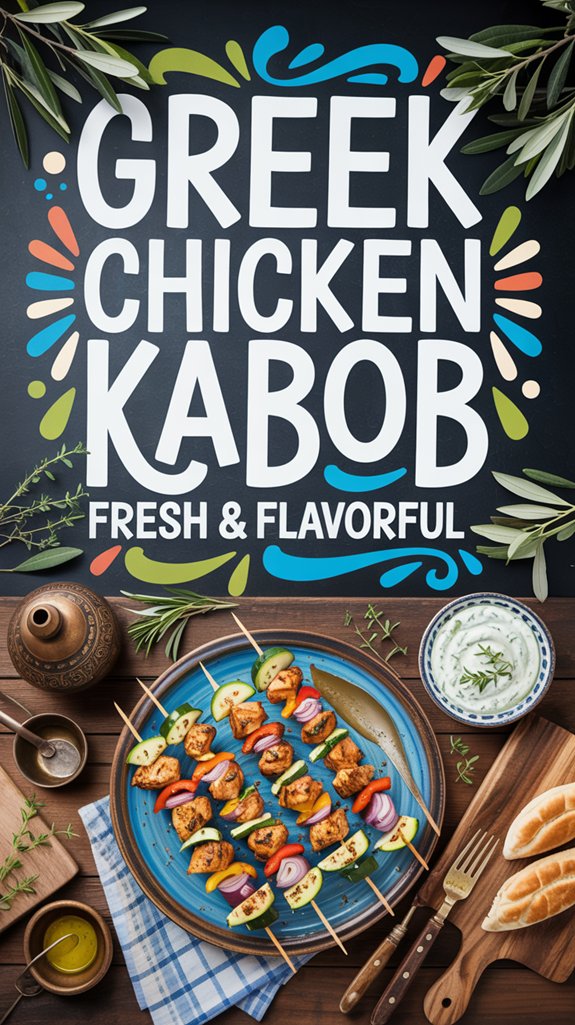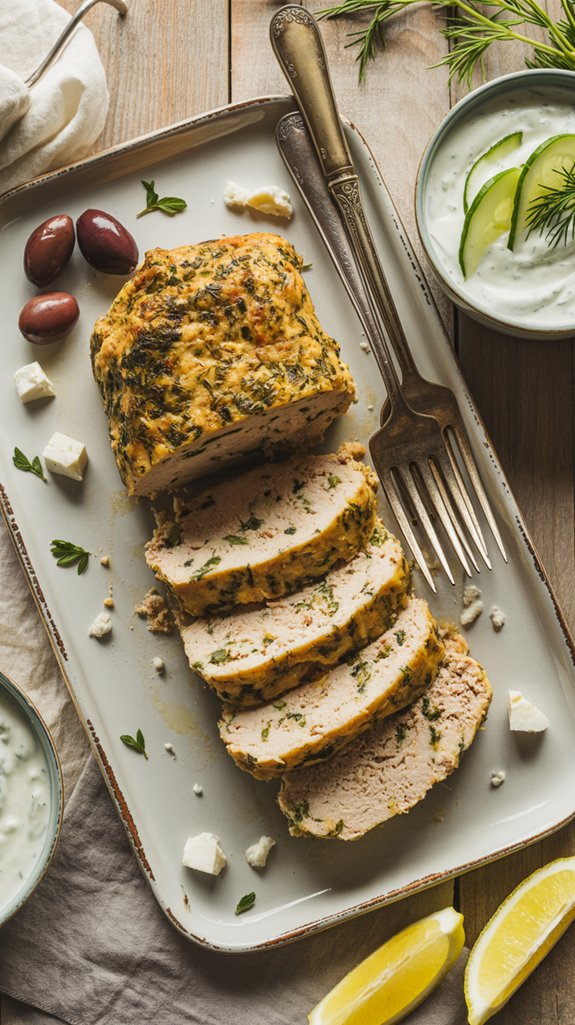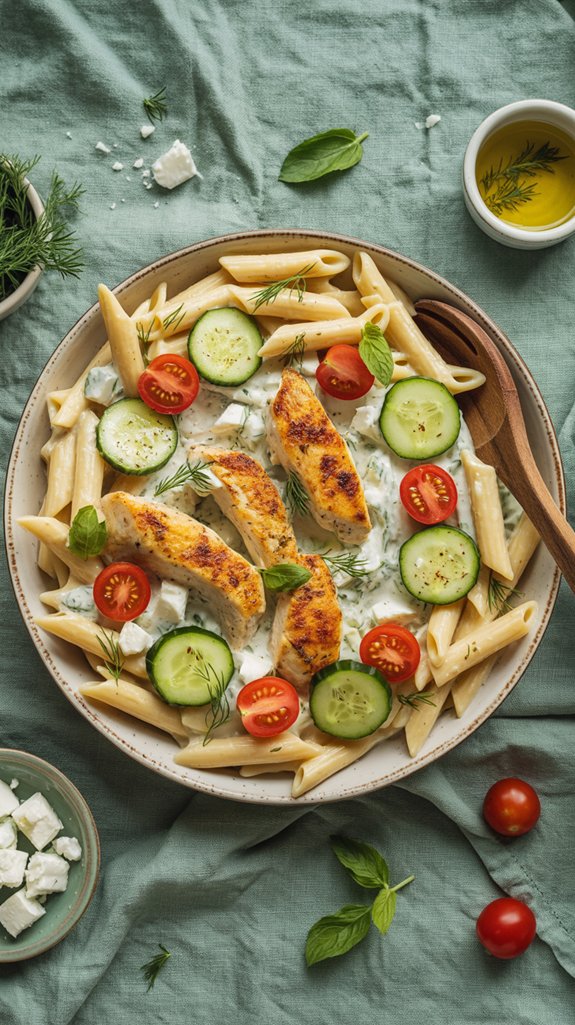Why You’ll Love This these Mediterranean Greek Chicken Kabobs
These Greek chicken kabobs are marinated in a tangy yogurt and feta mixture that makes the chicken incredibly tender and packed with Mediterranean flavor.
The combination of lemon zest, oregano, and that crumbly feta cheese creates this amazing Greek-inspired marinade that does all the heavy lifting for you.
Plus, threading everything onto skewers means you get perfectly portioned chicken, sweet bell peppers, and caramelized onions all in one bite – and cleanup is basically nonexistent since it all happens on the grill.
Ingredients List
Here’s everything you need to make these flavor-packed Mediterranean chicken kabobs that’ll transport your taste buds straight to a Greek island.
- 1 lb chicken breast tenders or boneless skinless chicken breast
- 1 (8 ounce) container plain yogurt
- 1/3 cup crumbled feta cheese with basil and sun-dried tomato
- 1/2 teaspoon lemon zest
- 2 tablespoons fresh lemon juice
- 2 teaspoons dried oregano
- 1/2 teaspoon salt
- 1/4 teaspoon ground black pepper
- 1/4 teaspoon crushed dried rosemary
- 1 large red onion, cut into wedges
- 1 large green or red bell pepper, cut into 1-1/2-inch pieces
A few things worth noting about these ingredients:
- The plain yogurt acts as a natural meat tenderizer thanks to its acidity, plus it’s loaded with probiotics for gut health
- Feta cheese brings calcium and protein to the party, though it can be a bit high in sodium if you’re watching that
- All those herbs and spices, especially oregano and rosemary, are antioxidant powerhouses that add serious flavor without extra calories
- Bell peppers are vitamin C champions, and red onions pack quercetin, which is great for inflammation
- You’re basically getting a complete, balanced meal on a stick with lean protein, healthy dairy, and colorful veggies
Step by Step Directions
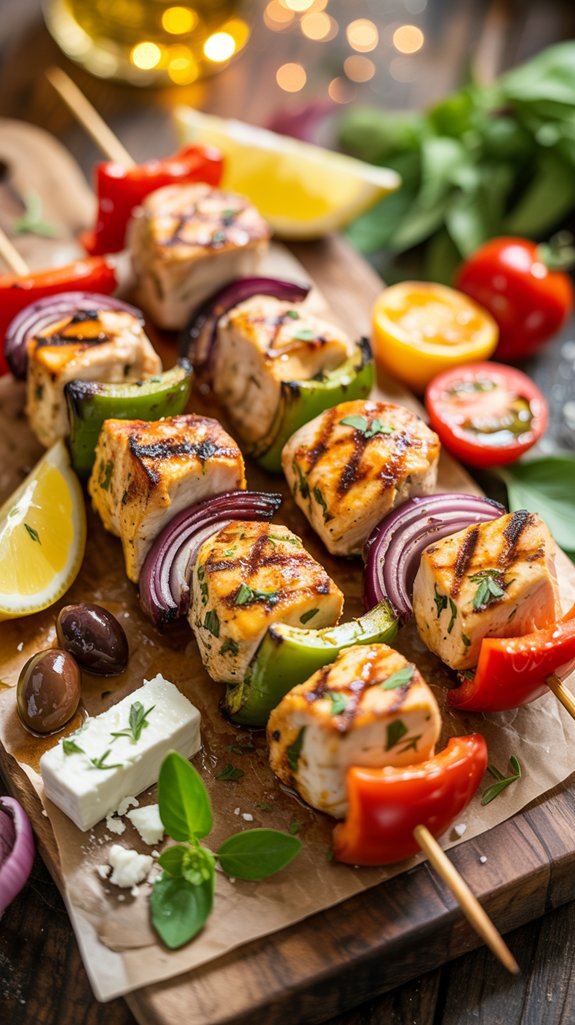
Making these Greek chicken kabobs is straightforward and requires just a few simple steps to create a delicious Mediterranean meal.
- Prepare the marinade – In a large shallow baking dish, mix together the yogurt, feta cheese, lemon zest, lemon juice, oregano, salt, pepper, and rosemary until well combined.
- Marinate the chicken – Place the chicken in the dish with the yogurt mixture and turn to coat all pieces thoroughly. Cover and refrigerate for 3 hours to allow the flavors to penetrate the meat.
- Prep your grill – Preheat an outdoor grill to high heat while you prepare the skewers.
- Thread the skewers – Remove chicken from marinade and thread onto skewers alternately with red onion wedges and bell pepper pieces, creating colorful, balanced kabobs.
- Discard marinade – Throw away any remaining yogurt mixture that came into contact with raw chicken for food safety.
- Grill to perfection – Place skewers on the preheated grill and cook until chicken is no longer pink inside and juices run clear, turning occasionally for even cooking.
For the best results, consider using high-quality Mediterranean cookware designed specifically for authentic Mediterranean cooking techniques.
Substitutions and Variations
• Herb variations – Fresh herbs trump dried every time when you have them.
Use about three times the amount of fresh oregano or rosemary, and throw in some fresh mint for an authentic Greek touch that’ll transport you straight to Santorini.
Additional Things to Serve With This Dish
These kabobs practically beg for a full Mediterranean spread that’ll make your dinner table look like a Greek taverna.
- Fluffy rice or quinoa – Something to soak up all those incredible marinade flavors that’ll be dripping off your chicken, because letting any of that herby goodness go to waste is basically a crime against good food.
- Warm pita bread – Perfect for wrapping up pieces of chicken with some tzatziki, creating little handheld bundles of Mediterranean heaven.
- Greek salad – Tomatoes, cucumbers, red onion, and more feta cheese, because you can never have too much feta when you’re going full Greek.
- Tzatziki sauce – Cool, creamy, and garlicky, it’s the perfect cooling contrast to the herb-crusted chicken.
- Roasted vegetables – Zucchini, eggplant, or cherry tomatoes tossed with olive oil and oregano, keeping that Mediterranean theme going strong.
- Lemon potatoes – Crispy on the outside, fluffy on the inside, and loaded with lemon flavor that echoes the brightness in your kabobs.
- Hummus and olives – For nibbling while the grill heats up, though to be frank, half the hummus will probably disappear before the chicken even hits the grill.
Cooking Tips & Tricks (Chef’s Notes)
Getting these kabobs just right isn’t rocket science, but a few insider tricks will take them from good to absolutely divine.
- Don’t skip the marinating time – Three hours is the sweet spot where the yogurt tenderizes the chicken without turning it mushy, and trust me, you’ll taste the difference between a properly marinated piece and one that got rushed.
- Cut chicken into uniform pieces – About 1.5-inch chunks work perfectly, cooking evenly while staying juicy, because nobody wants some pieces charred while others are still doing the pink chicken dance.
- Soak wooden skewers for 30 minutes – Unless you enjoy the aroma of burning wood competing with your beautiful Mediterranean herbs, which honestly doesn’t pair well with anything.
- Leave space between pieces – Cramming everything together creates steam instead of that gorgeous caramelized exterior we’re after, so give each piece some breathing room.
- Oil your grill grates – A paper towel dipped in oil and grabbed with tongs does the trick, preventing that heartbreaking moment when half your chicken decides to become one with the grill.
- Use medium-high heat, not scorching hot – You want a nice sear without incinerating the outside before the inside cooks through, which is basically the grilling equivalent of wearing a winter coat in summer.
- Turn only once – Let each side develop a proper crust before flipping, resisting that urge to constantly poke and prod like an anxious helicopter parent.
Nutritional Facts
Each serving of these Greek chicken kabobs delivers impressive nutritional value while keeping calories in check.
- Calories per serving: Approximately 285 calories (based on 4 servings)
- Protein powerhouse: 35 grams of lean protein per serving, supporting muscle maintenance and keeping you satisfied
- Low carbohydrate: Only 8 grams of carbs, making it perfect for low-carb and keto-friendly meal plans
- Healthy fats: 12 grams of fat, primarily from the yogurt and feta cheese, providing essential fatty acids
- Calcium boost: 180mg of calcium from the yogurt and feta, supporting bone health
- Vitamin C: Bell peppers contribute 95mg of vitamin C, nearly meeting your daily requirement
- Probiotics: Greek yogurt provides beneficial bacteria for digestive health
- Low sodium: 420mg per serving when following the recipe as written
- Zero trans fats: All fats come from natural, wholesome sources
- High in B vitamins: Chicken provides essential B6 and niacin for energy metabolism
- Antioxidant rich: Oregano and rosemary contribute powerful antioxidants with anti-inflammatory properties
Fun “Did You Know?”
Beyond their impressive nutritional profile, these Mediterranean chicken kabobs carry fascinating stories that’ll make your next dinner conversation as flavorful as the meal itself.
I’ve found that souvlaki, Greece’s beloved kabob tradition, dates back to ancient times when soldiers cooked meat on swords over campfires. The yogurt marinade isn’t just for flavor—it’s an ancient tenderizing technique that Greek cooks have perfected over centuries.
Here’s something that amazes me: feta cheese was originally stored in goat bladders, and the word “souvlaki” literally translates to “little skewer.”
These kabobs truly connect us to Mediterranean culinary heritage.

